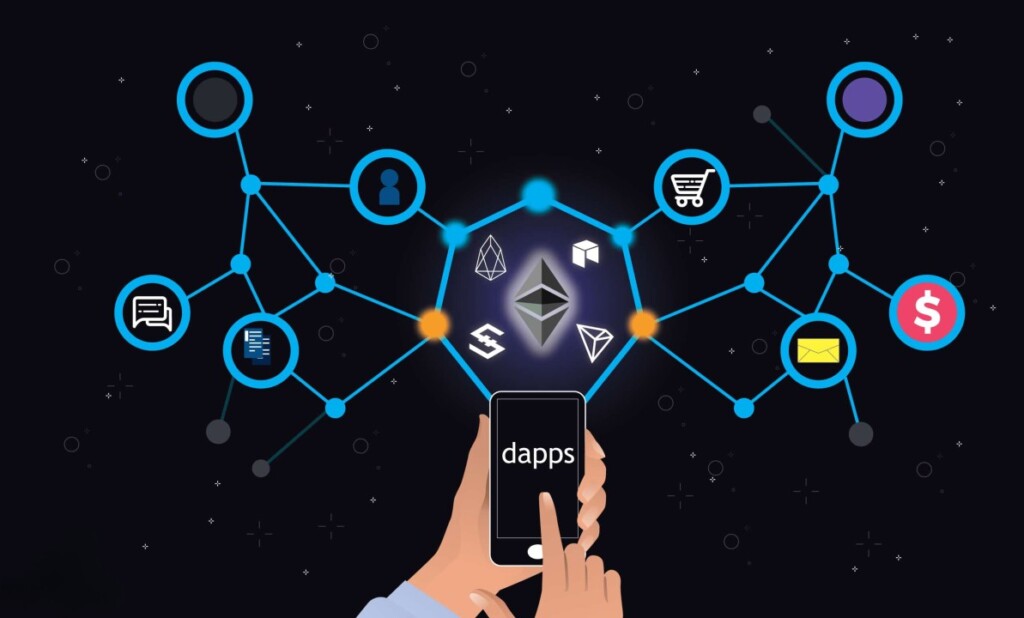Think about the apps you use everyday banking apps, social media, e-commerce platforms. They all have one thing in common: they’re controlled by a central authority. Every transaction, every interaction, and every data exchange goes through a company’s servers, which can be hacked, manipulated, or even shut down at any moment. But what if there was a different way? One where no single entity held the keys to the kingdom? That’s exactly what decentralized applications, or DApps, are bringing to the table.
Decentralized apps are built on blockchain technology, eliminating the need for intermediaries and reducing risks tied to centralized control. They provide businesses with more transparency, improved security, and a level of resilience that traditional apps just can’t match. And it’s not just hype; according to a report from DappRadar, the number of active DApp users grew by over 396% in 2021, signaling that businesses need to pay attention or risk being left behind.
Now, let’s break this down in a way that makes sense for your business.
What Exactly Are DApps?
A decentralized application (DApp) is like any other software application, except it runs on a decentralized network, typically a blockchain, rather than on a single server. Unlike traditional apps owned and operated by a company, DApps use smart contracts to execute operations automatically. There’s no single authority controlling the entire system, which means no middlemen, no single point of failure, and a level of security that traditional apps can’t match.
Key characteristics of DApps include:
- Decentralization – No single company or entity has control over the entire system.
- Open Source – Many DApps allow the community to review and contribute to their code.
- Blockchain-Based – Transactions and data storage happen on the blockchain, ensuring transparency.
- Token-Driven – Most DApps have their own tokens that fuel transactions and reward users.
This shift in architecture is already taking over multiple industries, from finance and healthcare to gaming and supply chain management.
The Brains Behind DApps
If DApps are the engines of decentralization, smart contracts are the fuel. These self-executing contracts eliminate the role of intermediaries by automatically enforcing agreements based on pre-set conditions.
For example, imagine a real estate business using a smart contract for rental agreements. Once the tenant sends payment, the contract releases access to the property. there is no need for paperwork, bank approvals, or waiting periods. Everything is automated, reducing human errors and streamlining operations.
Businesses in finance, legal, and supply chain industries are already seeing massive benefits from smart contracts. They cut down costs, improve efficiency, and reduce disputes by making sure that every transaction is recorded on the blockchain.
Why DApps Are a Big Deal for Businesses
Traditional apps are efficient, but they come with baggage, data privacy concerns, security risks, and increasing operational costs. And the business landscape is changing fast. In 2022 alone, the global blockchain market was valued at around $4.8 billion, and it’s expected to skyrocket to more than $65 billion by 2030. With companies like Microsoft, Meta, and JPMorgan experimenting with blockchain-based solutions, DApps are no longer just for crypto enthusiasts; they’re creeping into the mainstream in ways businesses can’t afford to ignore.
-
No More Middlemen
Third-party platforms love taking their cut. Whether it’s banks processing transactions, cloud providers storing data, or social media platforms monetizing user data, businesses often end up paying hefty fees. DApps cut out the middlemen by automating transactions and data storage through blockchain, saving businesses thousands, if not millions, in operational expenses.
-
Greater Security & Resistance to Hacking Attempts
Traditional apps store sensitive data in centralized servers, making them prime targets for cyberattacks. With DApps, data is distributed across multiple nodes, making breaches extremely difficult. This is especially important for the industries that deal with sensitive financial and healthcare data, as well as legal services.
According to Cybersecurity Ventures, cybercrime will cost businesses $10.5 trillion annually by 2025. DApps offer a more secure framework, reducing the risks of single-point failures.
-
Increased User Trust Through Transparency
Consumers and businesses alike are becoming hyper-aware of how their data is used. Transparency is no longer a luxury—it’s an expectation. Because DApps run on a blockchain, anyone can verify transactions, code changes, and operational processes in real-time. This level of transparency builds trust with customers, investors, and stakeholders.
-
Scalability Without the Growing Pains
Most businesses start small, but the goal is always growth. Scaling traditional apps comes with complications—more servers, higher costs, and increased risk of downtime. DApps are designed to scale effortlessly because they operate on decentralized networks that expand organically. This means businesses can grow without massive infrastructure overhauls.
Industries That Can Benefit the Most from DApps
While DApps sound like the future, they’re not a magic bullet. Businesses need to be aware of certain challenges before investing in them.
-
Finance & Banking
The rise of Decentralized Finance (DeFi) has shown that financial services don’t have to rely on traditional banks. Lending, borrowing, and trading can all happen through DApps without third-party control. With the total value locked in DeFi platforms reaching over $50 billion, businesses in fintech must pay close attention to this shift.
-
Supply Chain & Logistics
Keeping track of shipments, inventory, and supplier transactions can be a nightmare. DApps provide real-time tracking, tamper-proof record-keeping, and automated smart contracts that streamline supply chain management.
-
Healthcare & Data Security
Patient data security is one of the biggest concerns in healthcare. Traditional centralized storage methods are vulnerable to breaches and data manipulation. DApps can protect patient records while allowing authorized parties (doctors, hospitals, insurers) to access necessary information without compromising security.
-
Real Estate & Smart Contracts
Real estate transactions involve multiple layers of verification, making the process long and expensive. DApps simplify the process by using smart contracts to handle property transactions, eliminating unnecessary paperwork and reducing fraud risks.
Key Challenges & Considerations
While DApps sound like the future, they’re not a magic bullet. Businesses need to be aware of certain challenges before diving in.
-
User Adoption & Learning Curve
Despite their benefits, DApps aren’t as user-friendly as traditional apps yet. Many businesses hesitate to adopt them due to the learning curve associated with blockchain technology. However, as more user-friendly interfaces emerge, this will likely change.
-
Regulatory Uncertainty
Governments are still figuring out how to regulate blockchain-based applications. Businesses need to stay ahead of legal and compliance issues before fully integrating DApps into their operations.
-
Performance & Speed Issues
DApps can be slower than centralized apps due to network congestion and blockchain limitations. However, innovations like layer-2 scaling solutions and new consensus mechanisms are addressing these bottlenecks.
Businesses looking to adopt DApps must consider these barriers and develop strategies to work around them. However, the potential rewards most often outweigh the risks, especially for those willing to innovate early.
The Future of DApps
Blockchain technology is still evolving, and so are DApps. With advancements in Layer 2 scaling solutions, AI-driven automation, and cross-chain interoperability, DApps’ usability and efficiency are expected to improve significantly over the next decade.
Some key trends that you as a business owner should watch out for include:
- Mass Adoption of Web3 – As more internet services integrate blockchain, DApps will become as common as traditional apps.
- Enterprise-Level Adoption – More corporations will experiment with blockchain for logistics, identity verification, and financial services.
- Regulatory Frameworks – Governments and other regulatory bodies will develop clearer guidelines for businesses operating in the DApp space.
- Decentralized Autonomous Organizations (DAOs) – Businesses might shift to community-driven governance models powered by smart contracts.
How You Can Prepare for the DApp Revolution
Whether you’re a startup or an established corporation, getting ahead of the DApp wave requires proactive steps. Here’s how you can prepare your business for the DApp revolution:
- Educate Your Team – Understanding blockchain basics is the first step to integrating DApps into your business model.
- Experiment with Small-Scale Integrations – Consider integrating blockchain features like smart contracts or token-based rewards before diving into full-fledged DApp development.
- Stay Updated on Regulations – Keeping an eye on legal developments will help avoid compliance issues.
- Partner with Blockchain Experts – Hiring or consulting blockchain developers can make adoption smoother.
Is It Time for Businesses to Make the Switch?
The short answer? Not overnight, but definitely soon. Decentralized apps aren’t just some passing trend; they’re part of a fundamental shift in how digital interactions and business operations work.
Companies that start exploring and experimenting with DApps today will be better positioned to adapt as the technology matures. Whether it’s cutting costs, improving security, or building trust with customers, the benefits are too significant to ignore.
So, if you’re a business owner wondering whether DApps are worth your attention—the answer is yes. The question isn’t if DApps will become mainstream but when. When that happens, businesses that take early steps will have a serious advantage.
Want to be one of them? It might be time to start looking at how DApps can fit into your business strategy before your competitors beat you to it.


